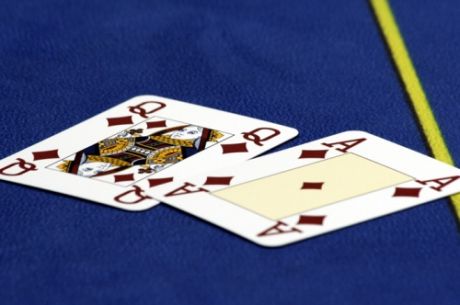For Poker Success, You Have to Be Able to Believe Impossible Things

In Lewis Carroll��s Through the Looking-Glass, there is a scene in which the White Queen claims to Alice that she��s ��one hundred and one, five months and a day.��
��I can��t believe that!�� responds Alice, but the White Queen insists she ��Try again: draw a long breath, and shut your eyes.��
��There��s no use trying,�� says Alice, adding ��one can��t believe impossible things.��
��I daresay you haven��t had much practice,�� is the White Queen��s response. ��When I was your age, I always did it for half-an-hour a day. Why, sometimes I��ve believed as many as six impossible things before breakfast.��
I was reminded of that delightful scene by its use in a biography I��m reading, Alan Turing: The Enigma by Andrew Hodges.
Turing was the astoundingly brilliant English mathematician who in 1936 first articulated the principles by which all modern computers work. He also, just incidentally, designed the machines that allowed British intelligence to read Axis military messages �� though the Germans were convinced they were using an unbreakable code �� thus allowing the United Kingdom to survive World War II, for which it was woefully unprepared. And, in his spare time, he developed the entire concept of artificial intelligence.
Hodges scatters his book with allusions to the White Queen��s punchline because Turing was a man who made a career out of believing impossible things �� and then making them possible.
What does this have to do with poker? Well, sometimes in poker it becomes necessary to believe impossible things �� or at least seemingly impossible things.
I well remember the first time I made a successful bluff holding 2x4x. My opponent had not seen me bluff in an hour or so of play, so when I represented having made trips on an 8x8xXx flop, he believed me. When I showed him my cards, he was obviously stunned, and could only manage to squeak out, ��Nice play, dude.��
The 2x4x has subsequently become my favorite tricky hand to play, because it��s one of those that opponents never see coming. For example, a couple of months ago I used it to stack a player who had JxJx, could not believe that I connected with a 4x4xXx flop, and called my all-in check-raise.
I have a friend who does similar things with 6x3x. He calls this hand ��The Spanish Inquisition�� because, in a nod to a famous Monty Python sketch, ��Nobody expects the Spanish Inquisition!��
My favorite episode of the World Poker Tour was during Season Two when Paul Phillips ended up playing Mel Judah for the title in the WPT Legends of Poker at the Bicycle Casino. In the final hand, Judah moved all-in with 9?7? on a board of 6?3?A?5?4?. Phillips had J?2?, for the lower end of the straight.
The interesting part was watching Phillips argue with himself on whether to call. He said, ��I can��t believe you would dream of playing a seven that way. I don��t believe it. I don��t believe it.��
He tanked for three minutes before making the crying call. He could not make himself believe what he deemed to be an impossible thing, and it cost him the tournament. Skip ahead to the 7:30 mark and you can see the hand play out here:
You tend to win the biggest pots when your hand is outside the range that your opponent will believe you can be holding. Having such ��impossible�� hands makes it possible to bluff convincingly, and makes it possible for your opponent to put all of his money in with a hand he is sure must be the best, when it isn��t.
In order to avoid being on the bad side of that kind of encounter, you have to be prepared to believe ��impossible�� things. You might need to believe, for example, that your opponent really did call your preflop raise with junky cards from out of position, then kept calling until he hit a runner-runner miracle. Or you might need to believe that your rock-solid, never-out-of-line opponent has chosen to bluff in a spot where even one of Phil Hellmuth��s despised ��idiot[s] from Northern Europe�� would not.
Simply put, poker players do not always play in sensible ways, and you have to be prepared to suss out when they have done something that seems impossible to believe.
Alan Turing died three years before he could have seen Rodgers and Hammerstein��s televised musical Cinderella, but I think he would have endorsed this lyric from it �� and so should the wise poker player:
But the world is full of zanies and fools
Who don��t believe in sensible rules
And won��t believe what sensible people say
And because these daft and dewey-eyed dopes
Keep building up impossible hopes
Impossible things are happening every day.
Robert Woolley lives in Asheville, NC. He spent several years in Las Vegas and chronicled his life in poker on the ��Poker Grump�� blog.
Get all the latest PokerNews updates on your social media outlets. Follow us on Twitter and find us on both Facebook and Google+!








